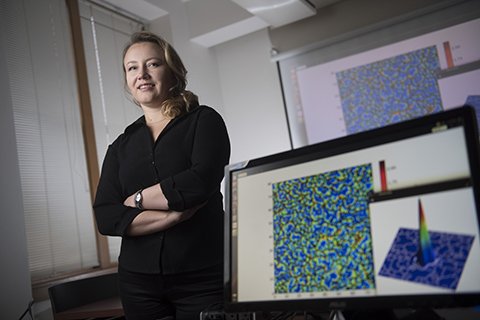Svitlana Mayboroda: Beyond borders

Written by Kermit Pattison
March 6, 2017
Svitlana Mayboroda, professor of mathematics, would much rather talk about her research than politics. Indeed, she has a lot to talk about. The young mathematician has earned numerous awards and a prestigious professorship.
Mayboroda’s research centers on partial differential equations and harmonic analysis. This work is useful for modeling physical systems, such as sound waves, light, or Wi-Fi, and plays a fundamental role in science and engineering. Her work has found applications in LED lights, semiconductor physics, and mechanical vibrations. “The center of my interest is the pure mathematics behind it,” Mayboroda said.
She notes that academics may face numerous barriers besides gender. Mayboroda herself encountered a few. She grew up in Ukraine at a time when an academic career seemed impossible. Her parents were educated as engineers, but went into business due to the dearth of professional opportunities. She earned the equivalents of a master’s degree in applied math and M.B.A. in finance in 2001. In those years following the breakup of the Soviet Union, opportunities in academia looked bleak.
Then a professor suggested she pursue graduate school at a far-away place called Missouri. “It sounded like the moon,” Mayboroda recalls.
She earned her Ph.D. in math at the University of Missouri in 2005, got postdoctoral positions at several universities, and quickly advanced through her field. She had a tenure-track position at Purdue University when the University of Minnesota recruited her. At the time, the department had only one other tenured female professor.
Mayboroda continued to make a mark. In 2011, she won a CAREER award from the National Science Foundation (NSF) for her work in partial differential equations in non-smooth media. Three years later, she earned an interdisciplinary NSF award of $800,000 for her work at the interface of mathematics, physics, and engineering. More honors came quickly. The Association for Women in Mathematics awarded Mayboroda the first-ever Sadosky Award, which recognizes women in early stages of their careers. She was elected as a fellow of the American Mathematical Society. In 2016, the University of Minnesota named her a Northrop Professor, a prestigious recognition for scholars who make significant contributions in their fields.
“Mathematics, perhaps as much as other scientific fields, is often perceived as a game of the young,” Mayboroda said. “You are supposed to be continuously on track in the early years of your career. This is very difficult for women because of family factors. You cannot take three years off after graduate school and come back just as successfully.”
Much of the bias is structural: academics are expected to show peak performance early in their careers— the same stage in life when professionals start families and raise children.
The attrition rate among female mathematicians shows that women are most likely to drop out of the field during these years.
Shortly after arriving in Minnesota, Mayboroda began organizing workshops for women on harmonic analysis and elliptic partial differential equations. The workshops targeted women in the early stages of math careers—the point where the pipeline is especially leaky. Nationally, women earn 42 percent of undergraduate mathematics degrees and 31 percent of Ph.D.s in math. Yet women comprise only 19 percent of mathematics postdocs and 12 percent of tenure track faculty.
“I felt extremely privileged to have been able to gather so many absolutely outstanding women in the field and to run a very powerful workshop for women,” said Mayboroda, who has organized three such events. “There are more coming along. I’m very happy to see a strong and ambitious young cohort, and I hope that the workshops have helped them a little bit.”
Her biggest hope is that universities remove structural and social barriers to full participation. Social expectations still make it more likely that women will interrupt their careers to raise families, particularly when two partners have to move to different locations to advance their careers.
“I would like to see a society in which the opportunities are equal and the expectations are equal, and it is as common for a man to take off time for family as it is for a woman,” Mayboroda said. “At this point, a very important component of such efforts should be University-wide attention to spousal hiring, as well as generous policies for family leaves.”
Mayboroda said such measures will help balance the equation when it comes to gender. “The goal of the entire exercise should be to say it’s possible,” she said. “If you only underline the fact that it’s tremendously difficult and biased, we’re not going to attract anyone. What should be underlined is that it’s possible and rewarding to be a woman and to be successful in this field.”
